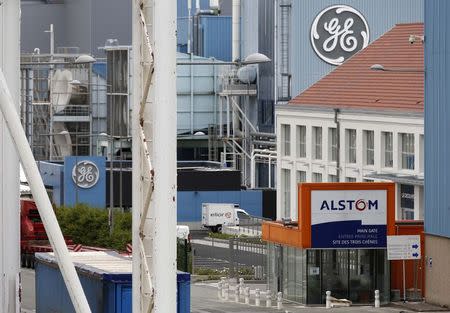Alstom minority investors criticise GE deal

By Natalie Huet and Benjamin Mallet PARIS (Reuters) - Minority shareholders in Alstom criticised its planned tie-up with General Electric , saying they had not been given enough information, and some voiced concern about the French government's influence as a result of the deal. The French train and turbine maker last month agreed a $16.9 billion deal with GE that will see the U.S. conglomerate acquiring most of Alstom's energy business. The deal, which sparked a two-month tug-of-war with the government, is expected to close in the first half of 2015. The deal will have to win the two-thirds majority approval from Alstom shareholders during an extraordinary meeting in the fourth quarter, Alstom Chief Executive Patrick Kron told the firm's annual shareholder meeting in Paris on Tuesday. It is not clear at this stage whether the firm's biggest shareholder Bouygues , with a 29 percent stake, will take part in the vote or accede to calls from some minority investors to step aside because of its role in the deal. The government gave its blessing to the tie-up only after it won the option to buy 20 percent of Alstom from the construction group. With the second-biggest Alstom shareholder having a stake of about just 5 percent, minority investors could play an important role if Bouygues decides not to participate in the vote. A Bouygues spokesman declined to comment. Throughout Tuesday's shareholder meeting, several minority shareholders voiced concern over the future shape and governance of the firm, which will be refocused on transport and is set to have the French state as its top shareholder. Colette Neuville of shareholder lobby ADAM complained that minority investors had not been given enough information on the value of Alstom's various assets. She noted that Alstom shares had slumped over 10 percent since the deal was announced. "I think this slump in shares is due to the fact we don't really know what role the state will play in the future Alstom," she said. CASH The government had threatened for weeks to veto the sale of most of Alstom's power arm to GE, saying it would not let a strategic power and rail group be "devoured" by a foreign firm. It pressured GE to dramatically reshape its offer to include commitments to create local jobs and set up joint ventures giving Alstom a future in the power sector. Alstom will also buy GE's rail signalling unit as part of the deal. The government agreed to the deal after it won the option to buy Alstom shares from Bouygues, saying the move would help ensure that GE fully meets its demands. Alstom will be reaping 12.35 billion euros from the GE deal, but will re-invest about 2.5 billion euros into three 50:50 joint ventures created in its electricity grid, renewable energy and nuclear power businesses. Alstom has said it plans to use the proceeds to pay off debt, strengthen its transport arm via acquisitions and return cash to shareholders, but has not provided a breakdown. On Tuesday, Kron said only that Alstom would have 7.5 billion euros cash in excess of what is needed to pay off its 3 billion euros of debt. Chief Financial Officer Nicolas Tissot said on the sidelines of the meeting that after investing in the joint ventures and buying GE's rail signalling unit, Alstom would be left with around 4.3 billion euros in cash. Alstom shares closed 1.1 percent lower. Analysts at JPMorgan have cut their price target to 27 euros a share from 33 euros, below analysts' consensus for 31 euros, stressing that GE's amended deal came with less cash and more complexity. "What a shame, it could have been so good," they wrote. They said GE's initial offer would have provided Alstom with a "clean start" as a company refocused exclusively on transport. They now expect from Alstom a cash distribution of 6 euros per share, compared with up to 18 euros with GE's original offer. (Editing by James Regan and Pravin Char)
